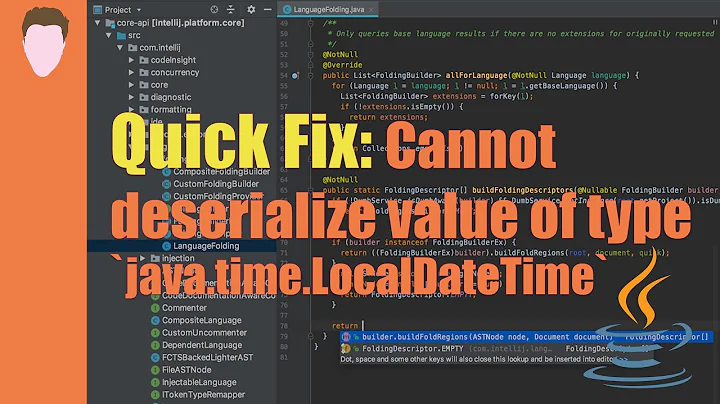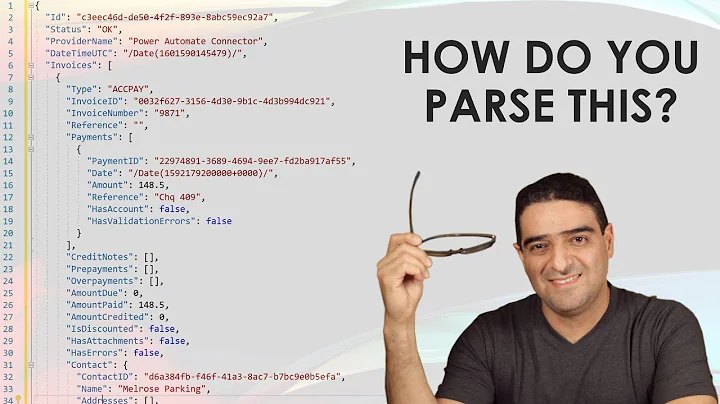How to parse non standard time format from json
Solution 1
That's a case when you need to implement custom marshal and unmarshal functions.
UnmarshalJSON(b []byte) error { ... }
MarshalJSON() ([]byte, error) { ... }
By following the example in the Golang documentation of json package you get something like:
// First create a type alias
type JsonBirthDate time.Time
// Add that to your struct
type Person struct {
Name string `json:"name"`
BirthDate JsonBirthDate `json:"birth_date"`
}
// Implement Marshaler and Unmarshaler interface
func (j *JsonBirthDate) UnmarshalJSON(b []byte) error {
s := strings.Trim(string(b), "\"")
t, err := time.Parse("2006-01-02", s)
if err != nil {
return err
}
*j = JsonBirthDate(t)
return nil
}
func (j JsonBirthDate) MarshalJSON() ([]byte, error) {
return json.Marshal(time.Time(j))
}
// Maybe a Format function for printing your date
func (j JsonBirthDate) Format(s string) string {
t := time.Time(j)
return t.Format(s)
}
Solution 2
If there are lots of struct and you just implement custom marshal und unmarshal functions, that's a lot of work to do so. You can use another lib instead,such as a json-iterator extension jsontime:
import "github.com/liamylian/jsontime"
var json = jsontime.ConfigWithCustomTimeFormat
type Book struct {
Id int `json:"id"`
UpdatedAt *time.Time `json:"updated_at" time_format:"sql_date" time_utc:"true"`
CreatedAt time.Time `json:"created_at" time_format:"sql_datetime" time_location:"UTC"`
}
Solution 3
I wrote a package for handling yyyy-MM-dd and yyyy-MM-ddThh:mm:ss dates at https://github.com/a-h/date
It uses the type alias approach in the answer above, then implements the MarshalJSON and UnmarshalJSON functions with a few alterations.
// MarshalJSON outputs JSON.
func (d YYYYMMDD) MarshalJSON() ([]byte, error) {
return []byte("\"" + time.Time(d).Format(formatStringYYYYMMDD) + "\""), nil
}
// UnmarshalJSON handles incoming JSON.
func (d *YYYYMMDD) UnmarshalJSON(b []byte) (err error) {
if err = checkJSONYYYYMMDD(string(b)); err != nil {
return
}
t, err := time.ParseInLocation(parseJSONYYYYMMDD, string(b), time.UTC)
if err != nil {
return
}
*d = YYYYMMDD(t)
return
}
It's important to parse in the correct timezone. My code assumes UTC, but you may wish to use the computer's timezone for some reason.
I also found that solutions which involved using the time.Parse function leaked Go's internal mechanisms as an error message which clients didn't find helpful, for example: cannot parse "sdfdf-01-01" as "2006". That's only useful if you know that the server is written in Go, and that 2006 is the example date format, so I put in more readable error messages.
I also implemented the Stringer interface so that it gets pretty printed in log or debug messages.
Related videos on Youtube
zola
Updated on July 09, 2022Comments
-
 zola almost 2 years
zola almost 2 yearslets say i have the following json
{ name: "John", birth_date: "1996-10-07" }and i want to decode it into the following structure
type Person struct { Name string `json:"name"` BirthDate time.Time `json:"birth_date"` }like this
person := Person{} decoder := json.NewDecoder(req.Body); if err := decoder.Decode(&person); err != nil { log.Println(err) }which gives me the error
parsing time ""1996-10-07"" as ""2006-01-02T15:04:05Z07:00"": cannot parse """ as "T"if i were to parse it manually i would do it like this
t, err := time.Parse("2006-01-02", "1996-10-07")but when the time value is from a json string how do i get the decoder to parse it in the above format?
-
RickyA almost 7 yearsPossible duplicate of Parsing a json datetime in revel
-
Adrian almost 7 yearsPossible duplicate of Parsing date string in golang
-
-
 Jonathan almost 7 yearsRight, and for the
Jonathan almost 7 yearsRight, and for theUnmarshalJSONfunc, OP could add multipletime.Parseattempts based on how many different formats need to be supported. I believe the format fortime.RFC3339is the default parser and more formats can be found in the docs -
 Kiril almost 7 yearsSure, when you have the custom un/marshal functions, you should try to cover every case that's possible.
Kiril almost 7 yearsSure, when you have the custom un/marshal functions, you should try to cover every case that's possible. -
Ainar-G almost 7 years
-
WaltPurvis almost 7 yearsWhat is JB in the
*j = JB(t)line? -
 Kiril almost 7 yearsSince you have a type alias, you need to cast it. Read this, and the corresponding links to the documentation: stackoverflow.com/questions/19577423/…
Kiril almost 7 yearsSince you have a type alias, you need to cast it. Read this, and the corresponding links to the documentation: stackoverflow.com/questions/19577423/… -
 danielcooperxyz over 5 yearsThe
danielcooperxyz over 5 yearsTheMarshalJSON()method causes a stack overflow panic, as it indirectly calls itself. -
Leo Alekseyev about 3 years@danielcooperxyz is right; you need a cast here:
return j.(time.Time).MarshalJSON()







